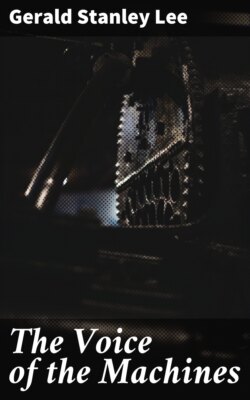Читать книгу The Voice of the Machines - Gerald Stanley Lee - Страница 10
На сайте Литреса книга снята с продажи.
PROPHETS
ОглавлениеTable of Contents
The world follows the creative spirit. Where the spirit is creating, the strong and the beautiful flock. If the creative spirit is not in poetry, poetry will call itself something else. If it is not in the church, religion will call itself something else. It is the business of a living religion, not to wish that the age it lives in were some other age, but to tell what the age is for, and what every man born in it is for. A church that can see only what a few of the men born in an age are for, can help only a few. If a church does not believe in a particular man more than he believes in himself, the less it tries to do for him the better. If a church does not believe in a man’s work as he believes in it, does not see some divine meaning and spirit in it and give him honor and standing and dignity for the divine meaning in it; if it is a church in which labor is secretly despised and in which it is openly patronized, in which a man has more honor for working feebly with his brain than for working passionately and perfectly with his hands, it is a church that stands outside of life. It is excommunicated by the will of Heaven and the nature of things, from the only Communion that is large enough for a man to belong to or for a God to bless.
If there is one sign rather than another of religious possibility and spiritual worth in the men who do the world’s work with machines to-day, it is that these men are never persuaded to attend a church that despises that work.
Symposiums on how to reach the masses are pitiless irony. There is no need for symposiums. It is an open secret. It cries upon the house-tops. It calls above the world in the Sabbath bells. A church that believes less than the world believes shall lose its leadership in the world. “Why should I pay pew rent,” says the man who sings with his hands, “to men who do not believe in me, to worship, with men who do not believe in me, a God that does not believe in me?” If heaven itself (represented as a rich and idle place—seats free in the evening) were opened to the true laboring man on the condition that he should despise his hands by holding palms in them, he would find some excuse for staying away. He feels in no wise different with regard to his present life. “Unless your God,” says the man who sings with his hands, to those who pity him and do him good—“unless your God is a God I can worship in a factory, He is not a God I care to worship in a church.”
Behold it is written: The church that does not delight in these men and in what these men are for, as much as the street delights in them, shall give way to the street. The street is more beautiful. If the street is not let into the church, it shall sweep over the church and sweep around it, shall pile the floors of its strength upon it, above it. From the roofs of labor—radiant and beautiful labor—shall men look down upon its towers. Only a church that believes more than the world believes shall lead the world. It always leads the world. It cannot help leading it. The religion that lives in a machine age, and that cannot see and feel, and make others see and feel, the meaning of that machine age, is a religion which is not worthy of us. It is not worthy of our machines. One of the machines we have made could make a better religion than this. Even now, almost everywhere in almost every town or city where one goes, if one will stop or look up or listen, one hears the chimneys teaching the steeples. It would be blind for more than a few years more to be discouraged about modern religion. The telephone, the wireless telegraph, the X-rays, and all the other great believers are singing up around it. The very railroads are surrounding it and taking care of it. A few years more and the steeples will stop hesitating and tottering in the sight of all the people. They will no longer stand in fear before what the crowds of chimneys and railways and the miles of smokestacks sweeping past are saying to the people.
They will listen to what the smokestacks are saying to the people.
They will say it better.
In the meantime they are not listening.
Religion and art at the present moment, both blindfolded and both with their ears stopped, are being swept to the same irrevocable issue. By all poets and prophets the same danger signal shall be seen spreading before them both jogging along their old highways. It is the arm that reaches across the age.
RAILROAD CROSSING
LOOK OUT FOR THE ENGINE!
